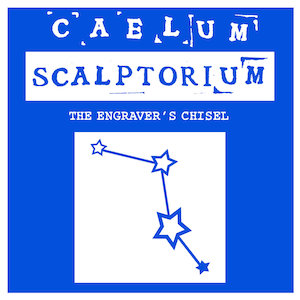 Gemma Khawaja – Caelum Scalptorium (The Engraver’s Chisel)
Gemma Khawaja – Caelum Scalptorium (The Engraver’s Chisel)
Self-Released – 1 May 2018
I last covered Gemma’s music in these pages just over two years ago (in May 2016), on the occasion of her album Such Mortal Sport, which presented Gemma’s persuasive personal takes of a dozen (predominantly) traditional songs.
Caelum Scalptorium weighs in at a welcomely hefty 72 minutes (and only one track clocks in at less than five minutes). Gemma’s are leisurely, deliberate renditions of the traditional songs, delivered with care and attention to detail yet without ever coming across as precious. Her singing style is firmly melodious with a strong signature vibrato, although to some listeners it may at first seem a touch unyielding when taken over the span of an entire album – and yet each individual song is unerringly crafted, with a feeling of inevitability as the story unfolds, so the listener cannot envisage a more satisfying treatment from Gemma’s hands and voice. Her own guitar accompaniments, while deceptively low-key, are also commendably accomplished, and her playing only draws attention to itself very occasionally in some rather noisy action (e.g. on the ballad Bill Norrie, which Gemma sourced from Martin Carthy’s version).
The album opens with Gemma’s animated account of One Night As I Lay On My Bed, begun in arresting a cappella mode before her bustling guitar enters the frame to tenderly augment the intense melodic line. Ingeniously compiled from the fragments of Sam Larner’s version and those by Ewan MacColl and Shirley Collins, Gemma’s own reading turns out strangely compelling (for all that the flow is momentarily disturbed just a touch by a couple of apparent hiatus points in the recording itself). Admirably, throughout the album Gemma’s careful to credit her sources, which aren’t always the “expected” or usual ones – for instance, she learned Searching For Lambs from the singing of Cyril Tawney, and The May Morning Dew from the singing of Dolores Keane. Gemma’s version of Low Down In The Broom, although originally learned from the singing of Frankie Armstrong, benefits from being slowed down to a pace resembling a courtly lament or dirge, and very effectively too (as Gemma says, “in order to heighten the forbidden passion of these two lovers”); a ghostly vocal harmony echo on the refrain and an ambient thunderstorm coda enhance the ominous taboo of the narrative. Gemma’s take on She Moved Through The Fair possesses something of a restlessness due to its slightly rushed folk-baroque lilt, while Though I Live Not Where I Love was (we learn from Gemma’s liner note) an instance of learning by fortuitous osmosis. Here Gemma departs just sufficiently from the usually-adopted slightly sentimental gait and tune to make hers a bold, personal and individual reading. The Isle Of Jewels, a song I’d not come across before, turned out to be a self-penned song, a kind of wish-fulfilment fable drawn from Hindu mythology.
On the remaining couple of songs, Gemma departs from the bare, intimate no-frills vox-and-guitar delivery, with imaginative use of sparse electronica and/or distant ambient sounds. Gemma’s take on the puzzling George Collins (said to be derived from at least two different Child ballads) is distinctly unsettling, with recessed eerie drones, half-heard voices and scary rumblings and crashes underpinning her impassioned a cappella delivery. On Westron Wynde, Gemma uses a spectral layered vocal backdrop to great effect; for the lyrics, Gemma uses the first two verses from the singing of Isla Cameron, then creates the subsequent verses from translations of a medieval poem: an imaginative and profoundly satisfying solution.
The album’s recording quality is quite raw and lo-fi, albeit a “different kind of raw” to the Ian Carter-produced Such Mortal Sport (not easy to describe, but you’ll likely hear what I mean from the outset if you’re already familiar with the earlier album). Caelum Scalptorium’s simply guitar-accompanied tracks have a timelessly plain and unadorned quality that mirrors Gemma’s own assessment of the songs timeless traditional status; however, she imparts a comparable degree of gravitas to the generous bonus track, her intensely powerful 14-minute account of Phil Ochs’ allegorical 1966 epic Crucifixion, which reinforces its message and points up its concordance with traditional balladry (such events recurring throughout history, of course).
And so, then, to the disc’s peculiarly cryptic title. There really is no alternative but to quote verbatim Gemma’s carefully-worded explanatory note: “Caelum is a small, insignificant constellation in the southern sky. Its name means Chisel in Latin. It is a rare word and is unconnected to the far more common Latin usage of the word caelum, to mean Heaven. The constellation Caelum used to be called Caelum Scalptorium, meaning The Engraver’s Chisel. Due to its small size and location away from the plane of the Milky Way, Caelum is a rather barren constellation, with few objects of interest. In google translate, a misspelling of Caelum Scalptorium as Caelum Scalptorum returns the pleasing translation of Heaven Cutter.”
Finally, a note on the album’s presentation. Like its predecessors, the physical (CD) incarnation of Gemma’s latest release is encased in a beautiful hand-made package, within the compartments of which are enclosed a mini-booklet of liner notes and some coin/amulet cutouts; the album’s also available as a digital download via Bandcamp.
Upcoming Dates
Aug 03 – Sidmouth Folk Festival, Sidmouth
Sep 04 – Star Folk Club, Glasgow
Sep 15 – East Anglian Traditional Music Day, Bungay
Along with Sharron Kraus, Jack Sharp, Shelagh McDonald, The Diamond Family Archive and many more, Gemma features on our Folk Show Episode 28. Listen here.
Photo Credit: Peter Tainsh
